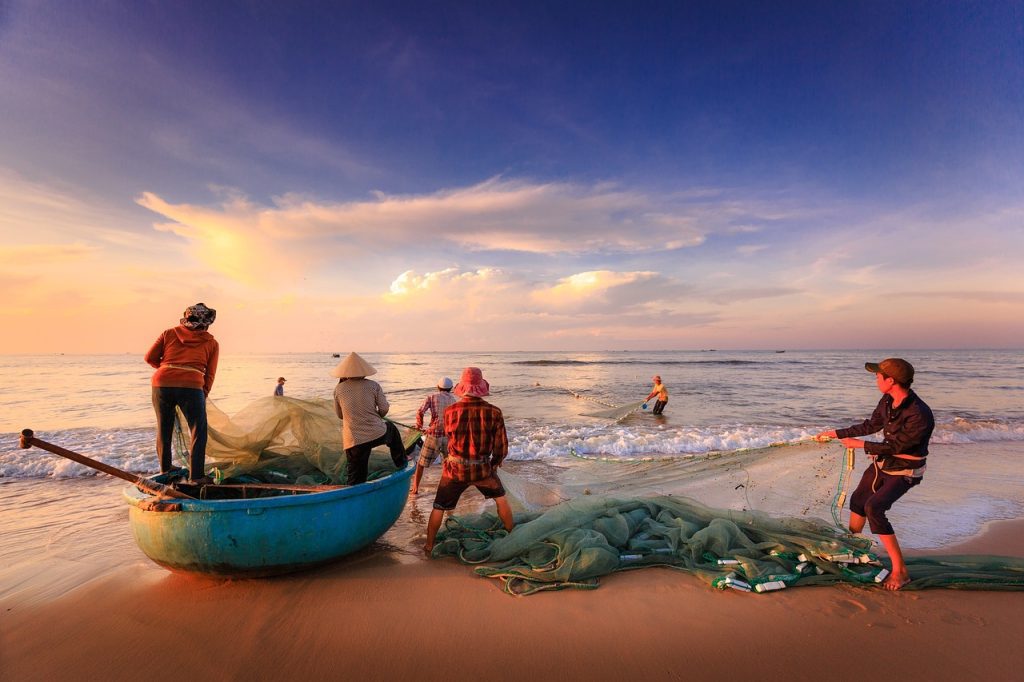Think of a vibrant coral reef teeming with life Now, picture that same reef seconds after an explosion.
The water clouds with debris, lifeless fish float to the surface, and the coral is shattered. This is blast fishing, one of the most destructive fishing methods in the world.
Also known as dynamite fishing, blast fishing uses explosives to kill fish in large numbers. The shockwaves stun or kill everything nearby, making it easy for fishermen to scoop up their catch.
The cost is catastrophic, entire ecosystems are wiped out in seconds, and the damage lasts for decades.
But how can we stop it?
How Blast Fishing Works (The Brutal Mechanics)
Blast fishing is shockingly simple – and devastatingly effective. Fishermen throw homemade bombs, dynamite, or even grenades into the water.
The explosion creates a powerful shockwave that ruptures fish swim bladders, killing them instantly or leaving them floating helplessly.
– Tools used in blast fishing:
- Improvised explosives: Often made from fertilizer, fuel, or repurposed military explosives.
- Grenades: In some regions, old military stockpiles are illegally used.
- Dynamite: Less common today but still found in areas with lax regulations.
When the bomb detonates, the pressure wave spreads outward, killing fish within a 50- to 100-meter radius.
The blast doesn’t discriminate – everything from small reef fish to turtles, dolphins, and even sharks can be killed or severely injured.
– The immediate aftermath of an explosion:
- Fish float to the surface, making them easy to collect.
- Corals are obliterated and their delicate structures are shattered into rubble.
- Non-target species die as bycatch, including endangered marine life.
This method is brutally efficient, but the long-term consequences are far worse than the short-term gains.
Why Blast Fishing Still Exists (The Driving Forces)
If blast fishing is so destructive, why do people still do it?
The reasons are a mix of desperation, economics, and weak law enforcement.
1. Quick Profits, Lasting Destruction:
For struggling fishermen, blast fishing offers a way to catch huge amounts of fish with minimal effort.
Traditional fishing requires time, skill, and patience while dynamite fishing delivers instant results.
In some coastal communities, the immediate payoff outweighs concerns about sustainability.
2. Poverty and Lack of Alternatives:
Many blast fishermen live in poverty with few job options. When fishing stocks decline due to overfishing, some turn to explosives as a last resort.
Without alternative livelihoods, the cycle continues.
3. Weak Enforcement and Corruption:
In countries where blast fishing is illegal, enforcement is often lacking. Remote coastlines, underfunded patrols, and corruption allow the practice to continue.
Some officials even take bribes to look the other way.
4. Cultural Acceptance in Some Regions:
In parts of Southeast Asia and East Africa, blast fishing has been practiced for generations.
Changing these deep-rooted habits requires education and economic incentives.
The Ecological Disaster of Blast Fishing
The damage from a single blast can last for decades.
Unlike overfishing, which depletes fish stocks over time, blast fishing annihilates entire ecosystems in seconds.
1. Turns Coral Reefs to Rubble:
Coral reefs grow slowly, some take hundreds of years to form. A single explosion can reduce a thriving reef to broken fragments.
Without coral, fish lose their habitats, and the entire food chain collapses.
2. Massive Bycatch:
Blast fishing doesn’t just kill fish, it kills everything nearby. Endangered species like sea turtles, dolphins, and juvenile fish are often victims.
Unlike selective fishing methods, explosives leave no chance for survival.
3. Long-Term Collapse of Fish Populations:
When reefs die, fish have nowhere to breed. Over time, local fisheries collapse, leaving communities without food or income.
Studies show blast-fished areas take 30-50 years to recover, and that’s if they recover at all.
4. Dead Zones and Tourism Losses:
Tourists won’t pay to dive in lifeless waters.
Many coastal economies rely on marine tourism, and blast fishing destroys that potential. Once-pristine dive sites become underwater wastelands.
The Human Cost of Blast Fishing
The consequences aren’t just environmental, they’re economic and deadly for people too.
1. Fishermen Risk Their Lives:
Improvised bombs are unstable.
Many blast fishermen suffer severe injuries – lost limbs, burns, or even death – from premature explosions.
2. Collapsing Fisheries:
When fish stocks disappear, legal fishermen lose their livelihoods.
Entire communities suffer when the ocean can no longer provide.
3. Economic Losses from Tourism:
Dead reefs mean no snorkeling, diving, or eco-tourism.
Countries like Indonesia and the Philippines lose millions in potential revenue due to blast fishing damage.
How to Stop Blast Fishing (Real Solutions)
Ending blast fishing requires a mix of strict laws, community engagement, and sustainable alternatives.
1. Stronger Laws and Enforcement:
- Increased patrols in blast fishing hotspots.
- Harsher penalties for offenders, including jail time.
- International cooperation to track illegal explosives.
2. Alternative Livelihoods for Fishermen:
- Sustainable fishing training – teaching methods like line fishing or aquaculture.
- Eco-tourism jobs – former fishermen can work as dive guides or conservationists.
3. Technology and Awareness:
- Underwater microphones to detect explosions.
- Drones and satellite monitoring to track illegal activity.
- Global awareness campaigns to reduce demand for blast-caught fish.
Bottom Line
Blast fishing is an ecological time bomb, it destroys marine life, ruins livelihoods, and leaves lasting scars on the ocean.
But there’s hope.
With stricter enforcement, education, and sustainable alternatives, we can end this destructive practice.
Here’s what you can do:
- Support bans on blast fishing in your country.
- Spread awareness by sharing this article or documentaries like The Cove and Chasing Coral.
- Donate to marine conservation groups working to stop illegal fishing.
The ocean can recover but only if we act now.
